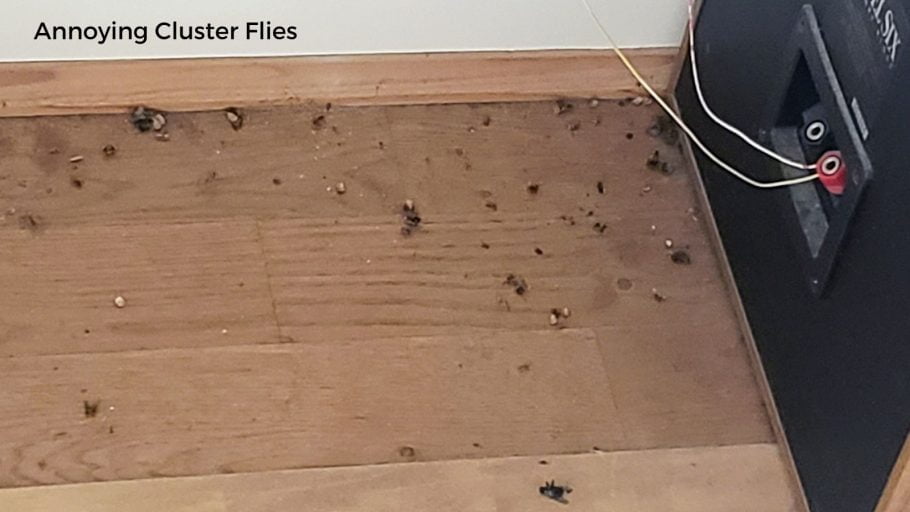Whether you’re a city slicker or a country dweller, bugs can be an unwanted nuisance. But if you live in the countryside, there is one type of fly that could cause more problems than others – cluster flies.
These pesky critters can enter your home in large numbers, driving you crazy as they buzz around your walls and windows. They begin to appear here during mud season in Maine. (The picture above also includes Asian ladybugs.) They often will return in the fall as temperatures start to drop.
If you’ve noticed an infestation of these pesky flies in your country home as the weather gets warmer in spring or colder in the fall, then here’s what to do about it.
Identifying Flies
Cluster flies are larger than the average housefly, growing to about a centimeter in length. They have grayish bodies with golden hairs on their abdomens and have rounded wings that overlap when at rest.
As their name suggests, these flies tend to form swarms around windows and other light sources within homes.
Cluster Flies vs House Flies
Cluster flies and house flies differ primarily in their behavior and habits. While house flies are commonly found in human dwellings and are attracted to food sources, cluster flies tend to gather on windows and light fixtures to seek warmth during colder months.
House flies are known for their rapid movement and are often seen buzzing around kitchens and garbage areas. In contrast, clusters move more slowly and are less bothersome to humans.
Additionally, a cluster fly is larger and has golden-yellow hairs on their thorax, making them distinguishable from the smaller, darker house flies.
Where Do Cluster Flies Come From?
These types of flies enter homes in the cool months of fall when they are looking for warm places to spend the winter. In the summertime, cluster flies will lay eggs in soil that contains earthworms; once hatched, the larvae feed on the earthworms until they reach adulthood and start the cycle all over again.
During this process, cluster flies may end up entering your home while looking for ideal areas to hibernate during cold weather spells. However, we do find them dead on windowsills for most of the winter and spring.
When it gets warm over 50+ degrees and is sunny, they start to fly around near the windows.
Reduce Attractants For Controlling Cluster Flies
Once you’ve identified the problem as these flies as a cluster type, the next step is to reduce any attractants that may be drawing them into your home. This includes things like pet food and open garbage cans—both of which provide a good food source for the flies.
Our dog Hunter used to love to take his food out of the dish and eat around the house which doesn’t help in our case with these pests.

Ensure all food sources are sealed tightly and that garbage cans are emptied regularly to prevent attracting more cluster fly visitors.
You should also make sure all doorways and windows are properly screened off so that the flies cannot enter your home.
How To Get Rid of Cluster Flies
Prevention
The best way to get rid of these flies is prevention. Seal up any cracks or crevices around your doors and windows where they may be entering from outside. You should also make sure that screens are properly fitted onto all doors and windows to help keep them out as much as possible.
If the flies have already made their way into your home, then it’s time to take some proactive steps toward getting rid of them once and for all. Vacuuming regularly is an effective way of removing them.
However, it won’t prevent them from coming back again so make sure you take measures to stop that happening too.
Anytime before we have guests I’m vacuuming all around the windowsills and hard-to-reach areas. However, you must clean the vacuum cleaner as the these dead flies can smell bad after a while.
Try using a fly spray or insect repellent inside your home as this will help create an environment where they don’t feel welcome and hopefully encourage them to move on elsewhere!
Treatments and Solutions:
If you find that there are too many of these flies for manual removal methods like swatters or vacuums, then it may be time to consider chemical treatments or professional pest control services. Chemical treatments include sprays or aerosols specifically designed for killing flying insects like a cluster fly.
Professional pest control services can provide a more comprehensive solution by addressing both indoor and outdoor areas where these pests may be coming from. Whichever method you choose, make sure to follow the instructions carefully to ensure maximum effectiveness.
Controlling with Insecticides and Pesticides
If prevention methods fail, then insecticides and pesticides may be necessary to deal with an infestation of these kinds of flies. There are many different types of insecticides on the market that can be used to get rid of cluster flies such as sprays, baits, dusts, aerosols, foggers, etc.
One method we learned was the tape method. Having tape around windows and entryways to catch them before they multiplied was helpful.
However, it is important to read the instructions carefully before using any type of pesticide product in order to ensure proper usage and safety precautions are taken.
Additionally, it is best practice to consult a professional pest control company before attempting any DIY methods as they have access to more advanced tools and techniques that may be necessary for severe infestations.
Conclusion: Eliminating Cluster Flies
These types of flies can be a real nuisance in country homes during the warmer months when they come out looking for shelter from the cold weather outside.
Taking preventative measures such as sealing up entry points, fitting screens on windows, and using insect repellent will help reduce their numbers significantly over time if done consistently. It is also important to take action right away when you see them.
If all else fails, contacting a pest control expert is advisable for fast results, especially if they can send someone to your rural home. We’ve had to wait months in the past few years due to a lack of help. Even in rural areas, small businesses are struggling to find help.
Luckily, this past year we found a new company that responded fast and was effective in eliminating most of them this past season.




